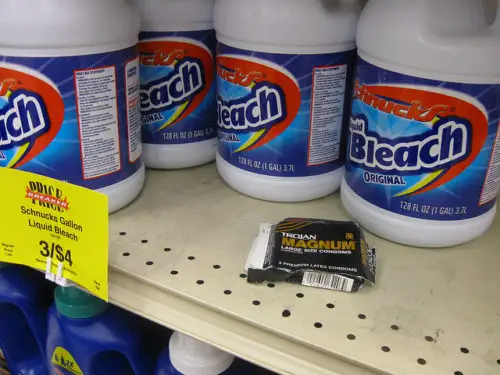No, pool shock is not the same as bleach. Pool shock contains a higher percentage of chlorine and is designed specifically for swimming pools and hot tubs.
When it comes to maintaining a clean and healthy swimming pool or hot tub, pool shock and bleach are two common cleaning agents that come to mind. While both contain chlorine, they are not the same thing. Pool shock is a granular form of chlorine that is designed to rapidly increase the chlorine level in the water, making it an effective way to kill bacteria and algae. On the other hand, bleach is a liquid disinfectant that is not designed for use in swimming pools or hot tubs. It also contains lower levels of chlorine than pool shock. In this article, we will explore the differences between pool shock and bleach and help you understand which one is best suited for your needs.

Credit: www.youtube.com
Chemical Composition And Function
Pool shock and bleach appear similar due to their ability to sanitize and disinfect various surfaces. Pool shock, however, is a mixture of calcium hypochlorite and sodium hypochlorite that can keep swimming pools and hot tubs clean. On the other hand, bleach derives its sanitizing power from sodium hypochlorite alone and is useful for household cleaning and laundry.
Although their chemical compositions differ slightly, both substances work by producing hypochlorous acid, which attacks contaminants and pathogens. The primary difference between pool shock and bleach is their intended usage. It’s important to use each product for its designated purpose, as they have varying concentrations and may be damaging if used interchangeably.
Types Of Pool Shock And Bleach
Pool shock and bleach are two common pool sanitizers, but are they the same? Let’s break it down. There are different types of pool shock, including calcium hypochlorite, sodium hypochlorite, and potassium peroxymonosulfate. Each has a specific purpose, such as eliminating bacteria or removing algae.
Bleach, on the other hand, usually refers to a household cleaner that contains sodium hypochlorite. It can be used as a substitute for pool shock but is not as effective. When it comes to comparing pool shock and bleach, it depends on the specific type of shock being used.
It’s important to read the labels and seek guidance from a professional to ensure proper pool maintenance.
Liquid Swimming Pool Chlorine & Bleach Compared
Uses In Household Cleaning
Pool shock and bleach are not the same, but both can be used in household cleaning. Bleach is a versatile cleaner that is effective in removing stains, mildew, and germs from floors, countertops, and bathrooms. It is also an excellent disinfectant that can be used to sanitize surfaces.
Bleach can be used to whiten your laundry and remove stubborn stains. On the other hand, pool shock is used to keep pools and hot tubs clean and clear. Although it can be used for cleaning, it is not recommended as it can be dangerous.
When using bleach or pool shock for cleaning, it’s important to follow safety precautions such as wearing gloves and ventilating the area. Always read the label and follow the instructions carefully.
Safety Considerations
Pool shock and bleach are two different chemicals. Safety considerations should be taken into account when using both products. When using pool shock for its intended purpose, it should be added to water and never the other way around. One should always wear protective gloves and goggles when handling pool shock.
Bleach is commonly used for cleaning, but it should never be mixed with other chemicals, especially ammonia. When using bleach, always open the windows for ventilation and never use it on non-white clothing. In comparison, pool shock requires careful handling to prevent accidents, while bleach requires proper ventilation and should not be mixed.
Both chemicals require caution and careful use to prevent injury or accidents.
Frequently Asked Questions For Is Pool Shock The Same As Bleach
What Is Pool Shock Made Of?
Pool shock is usually made of calcium hypochlorite or sodium hypochlorite that is in granular form.
Is Bleach The Same As Pool Shock?
No, bleach is not the same as pool shock. Bleach is typically a weaker version of chlorine, while pool shock is a potent form of chlorine that can increase the chlorine levels in the pool to a greater extent.
Can Pool Shock Be Used As A Substitute For Bleach?
It’s not advisable to use pool shock as a substitute for bleach as it’s not suitable for cleaning household items. Additionally, pool shock is much more potent and can be dangerous if not handled properly.
How Is Pool Shock Used In Pools?
Pool shock is used to increase the chlorine level in the pool, kill bacteria, and sanitize the water. It’s added directly to the water and works by releasing chlorine upon contact with water.
Can Pool Shock Be Used To Clean Surfaces?
No, pool shock is not recommended for cleaning surfaces as it can damage them and is not an effective cleaner. Bleach is a better option for cleaning surfaces.
Conclusion
Although pool shock and bleach share similar characteristics, they are not the same product. While both contain chlorine, the concentration and formulation differ significantly, making it essential to use the correct product for the intended purpose. Using bleach in a pool can lead to several issues, including poor water quality, damage to equipment, and potential health risks.
In contrast, pool shock is designed specifically for swimming pools, helping to eliminate bacteria, algae, and other contaminants that cannot be removed through regular maintenance. Therefore, it is vital to understand the differences between these products to ensure the proper care and maintenance of your pool.
By following manufacturer instructions and utilizing the right product, you can keep your pool clean, safe, and enjoyable for all.

